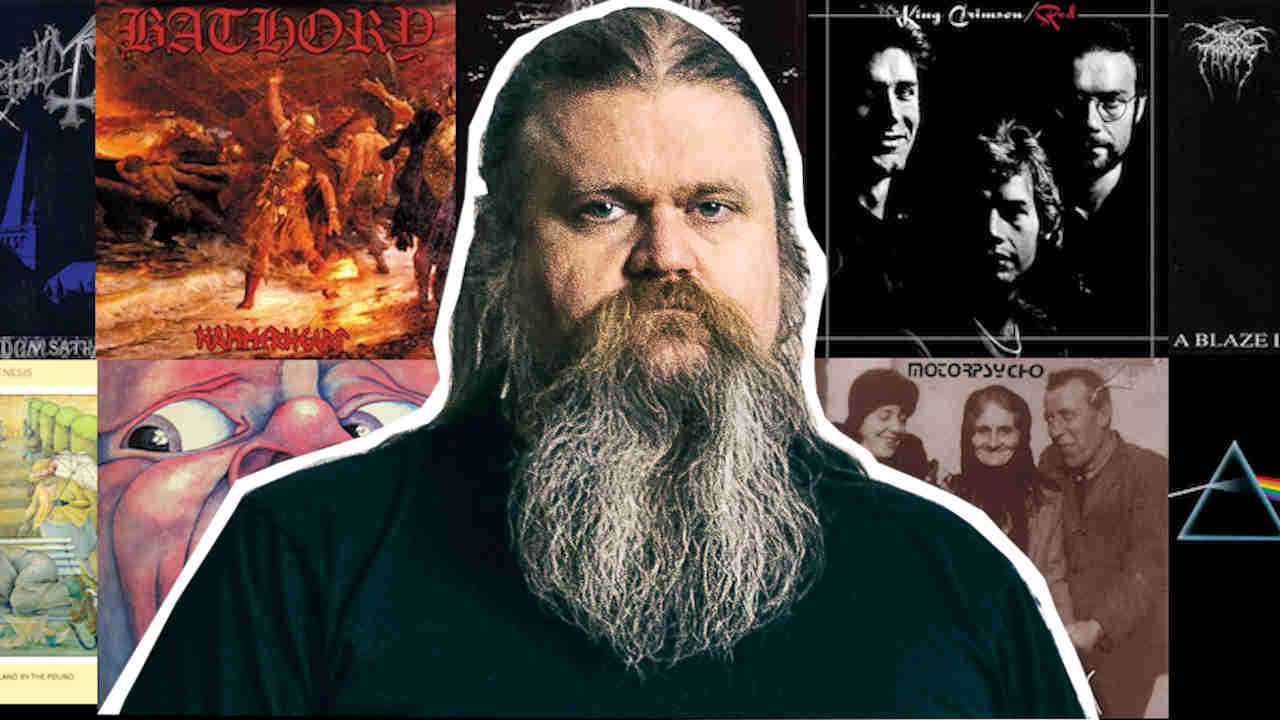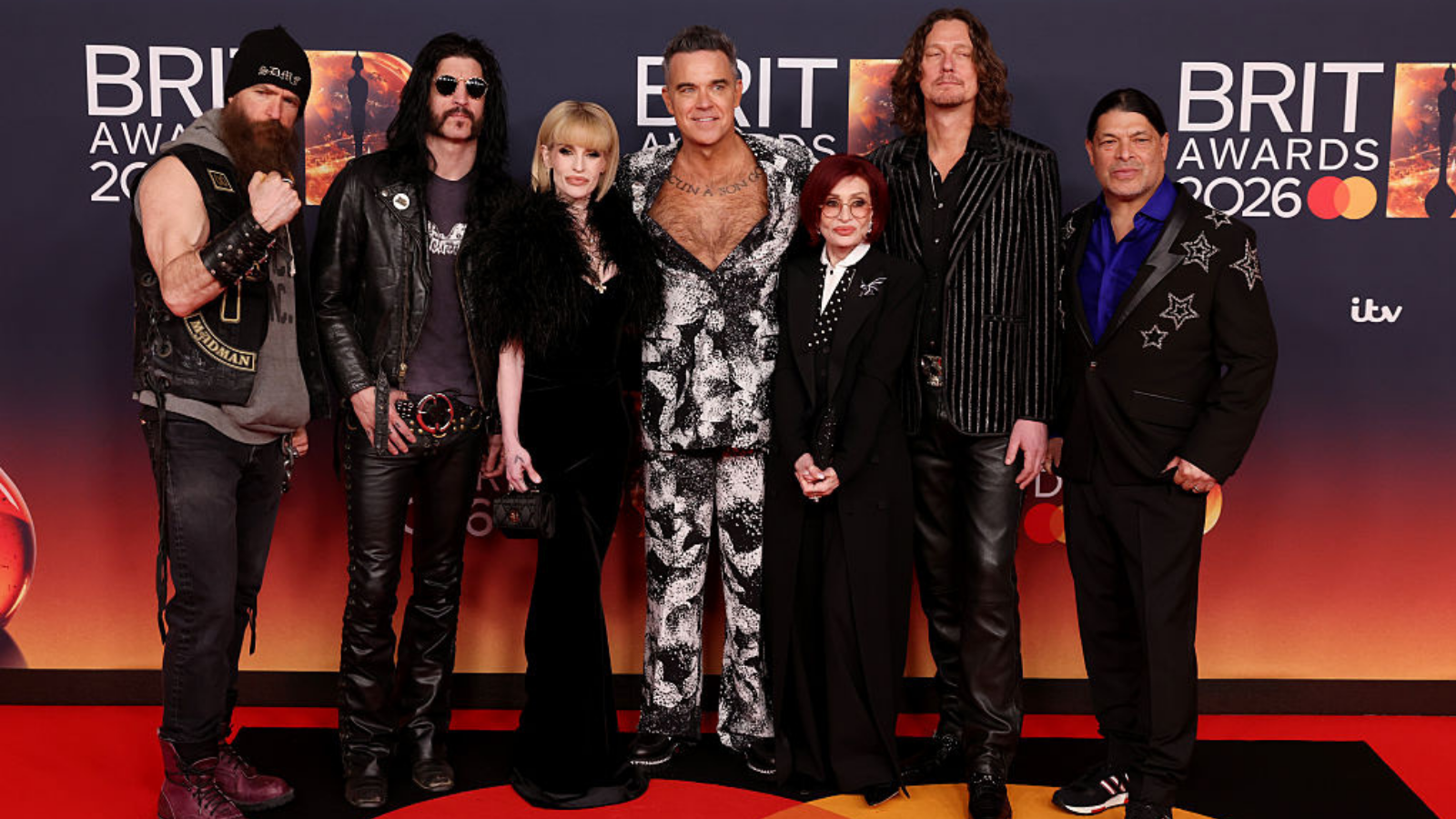Enslaved’s Ivar Bjørnson: 10 albums that changed my life
If it’s old school black metal or brain-melting prog rock you’re after, Enslaved’s Ivar Bjørnson is your man

Select the newsletters you’d like to receive. Then, add your email to sign up.
You are now subscribed
Your newsletter sign-up was successful
Want to add more newsletters?
Ivar Bjørnson is a Norwegian metal scene lifer. The guitarist was just 13 when he co-founded Enslaved in 1991 with bandmate Grutle Kjellson. His band’s 30-year journey has seen them transform from key members of black metal’s inner circle to prog metal éminence grises, via such landmark albums as 1997’s Eld, 2004’s Isa and 2020’s Utgard.
As Enslaved gear up to release the four-disc live-in-lockdown collection Cinematic Tour 2020, we asked Ivar to delve into his record collection and pull out the weird and wonderful albums that have shaped him.

Pink Floyd – The Dark Side Of The Moon (1973)
My dad had a good vinyl collection, and I would spend a lot of time sifting through it. Whenever I played Pink Floyd, there was something that really interested me, and he was really happy when he saw that spark of interest. On my eleventh birthday, he gathered up all the Pink Floyd albums he had on vinyl – which was most of them – and said, “There you go, they’re yours now.”
I listened to them all, but when I got to Dark Side Of The Moon, I just didn’t get any further. I kept flipping it over and starting again. There’s something about the continuity of the album, the way it goes from relief at the beginning onto all the angst at the end.
When you talk about the early Norwegian extreme scene, the prog influence gets left out. [Mayhem guitarist and black metal figurehead] Euronymous ran his record store, Helvete, in Oslo. I would go in there when I was really young, going, “Is there any good new death metal?”, and he’d say, “No, check out this Tangerine Dream album or this Swedish prog band.” For, the Pink Floyd influence comes from my dad, but most of the prog stuff afterwards came from that contact with the black metal scene.
Motorpsycho – Demon Box (1993)
Motorpsycho are a legendary band from Norway. They don’t do interviews or publicity - they have this mysterious aura around them. Demon Box was the first album of theirs that I heard. It’s a hard rock album, but it had incredible depth - there are parts that are almost indie-rock or grunge at times. It has the same dark vibe as Alice In Chains or Soundgarden - alienation, sorrow, contemplation on the state of things and how removed from other people are. And it has spoken-word interludes, with these distant voices that give you a feeling of a story being told far, far away.
I remember all the parties we had in the early 90s, there would be Bathory playing, or some advance tape from bands we knew. But at some point, somebody would put on Demon Box, and people would sit on the floor against a wall, drink beer and listen to it because it's so full.
Sign up below to get the latest from Metal Hammer, plus exclusive special offers, direct to your inbox!
Bathory - Hammerheart (1990)
This was the first album that I bought on vinyl with my own money I saved up from doing a little bit of janitor work at the school that my dad was a teacher at. When I bought Hammerheart, I had no idea who Bathory were – I just saw the cover with this painting of the Vikings pulling a boat, on fire, onto the water, and I had to hear what it sounded like.
I was already in a death metal project at the time, but this was something beyond anything I heard before. People talk about “Viking metal”, but we don’t really know what it sounded like. For me, Hammeheart is the ultimate sound of that – it’s so raw and at the same time so melodic and beautiful. It’s all encompassing.
Bathory - Twilight Of The Gods (1991)
If Hammerheart is the sound of what I regard as heritage-oriented metal, then Twilight Of The Gods is the philosophical backbone of it. It sounds like [Bathory mastermind] Quorthon grew up a lot between those two albums - it sounds more refined, especially with the use of acoustic guitar. Philosophically, it made realise how things could be used in a constructive and positive way – that it didn’t have to be just this barbaric entertainment or, even worse, politically twisting to the right.
King Crimson - In The Court Of The Crimson King (1969)
The first time I heard it, I was so shocked - I didn’t realise this kind of music existed. It was the missing link between everything I loved, prog, classic rock, metal.
The riff from the song 21st Century Schizoid Man is the definition of metal – when you see lists of bands who create metal, King Crimson are always left off for some reason. But there’s so much more on that record – it’s a deep dive into what it’s possible to do with a band. The way [Crimson guitarist and mastermind] Robert Fripp thinks about dynamics is mind-blowing. And the sleeve is actually the first tattoo I ever got.
King Crimson - Red (1974)
I was so enthralled by In The Court Of The Crimson King that I just kept listening to it for years and years. I was at some party and someone put Red on, and I immediately went, “What is this?” When they said it was King Crimson, I just said, “No, it sounds completely different, it’s a different band.” When they showed me the cover, my mind was blown again. It’s just so heavy, with this dark edge to it. I’m still trying to wrap my head around the fact that it’s the same band!
Genesis - Selling England By The Pound (1973)
Norwegians have a very strong relationship to English culture. A lot of our cultural identity is built around stuff that has come out of the UK, whether that’s The Beatles or Blackadder. [Original Genesis frontman] Peter Gabriel was theatrical in a very English way – it wasn’t raw and crazy and dark like a lot of the other old prog that I like. The way I did it was just beautiful and thoughtful, and it was a way of communicating cultural heritage that was tasteful and well done – it was definitely an inspiration for the way we deal with the Viking thing.
Tool - Ænima (1996)
Tool was a band that people were always talking about, but I kept dismissing them: “How could I get into a mainstream band? There’s no point even giving it a listen.” But at some point, I bought Ænima just to check out what was going on, and they really proved me wrong. It's absolutely stunning that they're such a huge band, commercially, and, at the same time, they have this depth and progressiveness.
Mayhem - De Mysteriis Dom Sathanas (1994)
I remember hearing rumours at the time about a new album from Mayhem, then around 1992 these tapes began to circulate - rough mixes of Freezing Moon straight out of recording, with no vocals. We drove to Oslo in Grulte's shitty little car and went to Helvete, and Euronymous let us borrow the entire first rough mix of the album: “Here, you can have it for three hours.” We just drove around on the ring-roads outside Oslo in silence, listening to it as many times as we could before going back to the shop and giving it back to him.
In many ways, it’s the same as Dark Side Of The Moon in that it still sounds like the best in class. So many years have passed, so many different styles have been invented, but nobody has made anything that sounds like this.
Darkthrone - A Blaze In The Northern Sky (1992)
The way Darkthrone switched from technical death metal [on debut album Soulside Journey] to really simplistic black metal on A Blaze In The Northern Sky and Under A Funeral Moon was just fantastic. It wasn’t about being shitty musicians, it was about under-playing and doing exactly what is needed for the atmosphere and the primitive, necro sound they had. It’s still the blueprint for simplicity in my own music. But it’s also about nostalgia too – when I put this on, I’m that 15-year-old kid again.
Enslaved’s Cinematic Tour 2020 is released on Jun 25
Dave Everley has been writing about and occasionally humming along to music since the early 90s. During that time, he has been Deputy Editor on Kerrang! and Classic Rock, Associate Editor on Q magazine and staff writer/tea boy on Raw, not necessarily in that order. He has written for Metal Hammer, Louder, Prog, the Observer, Select, Mojo, the Evening Standard and the totally legendary Ultrakill. He is still waiting for Billy Gibbons to send him a bottle of hot sauce he was promised several years ago.

